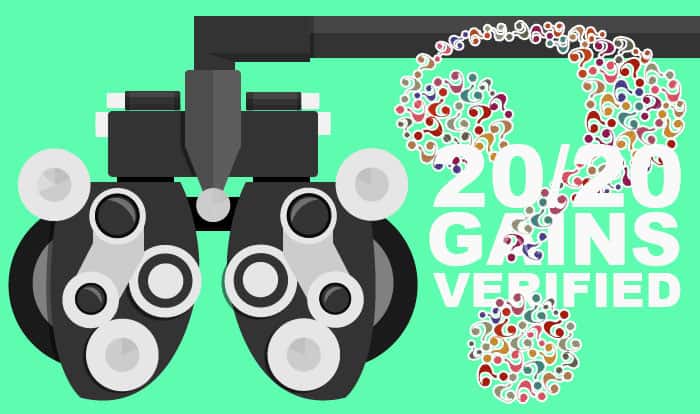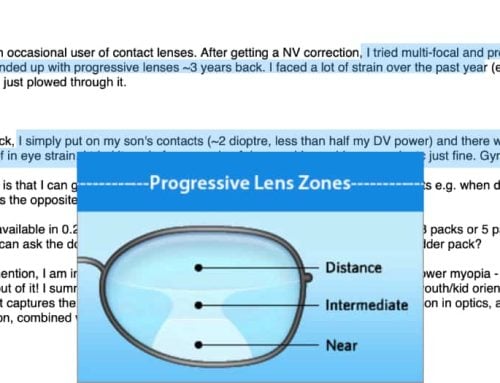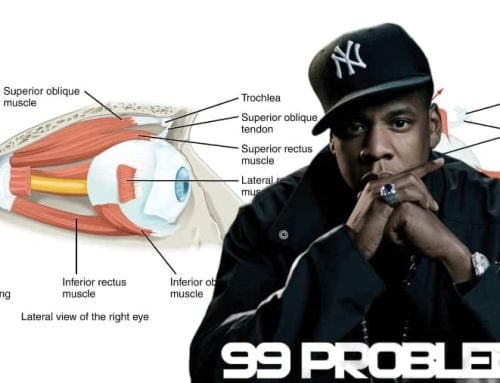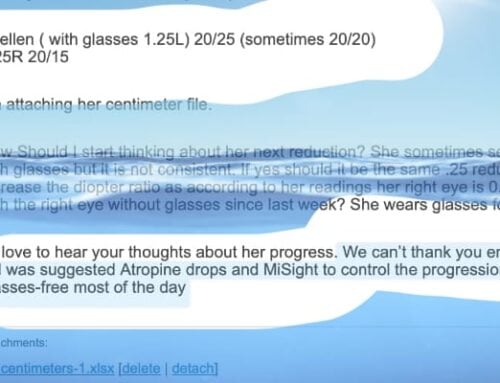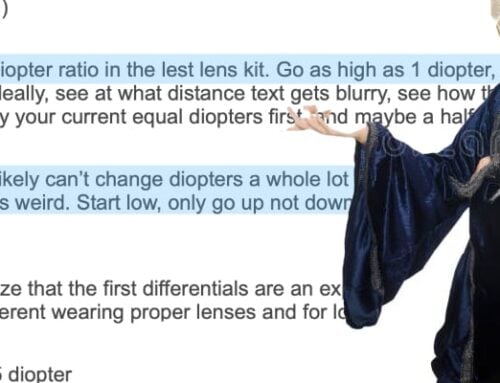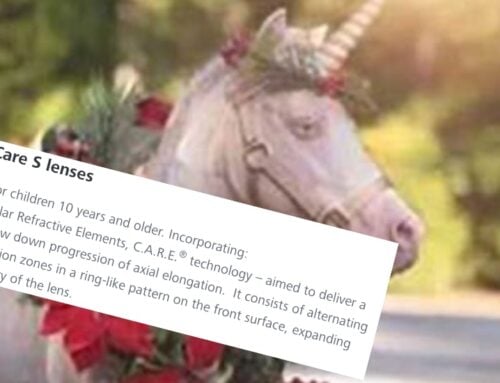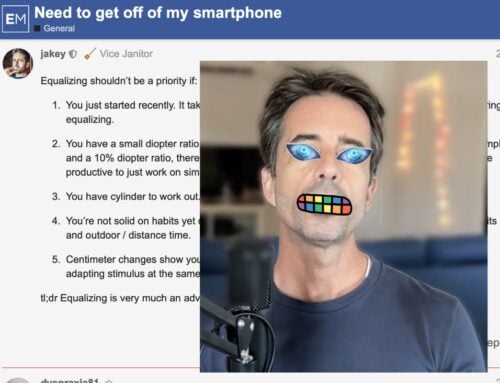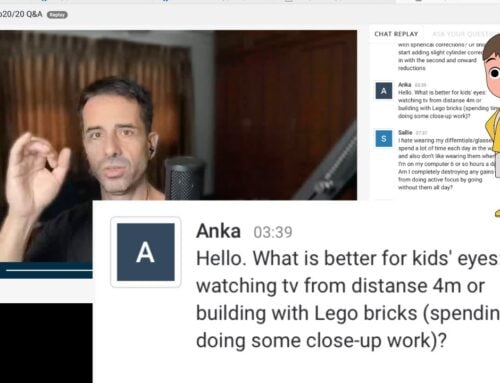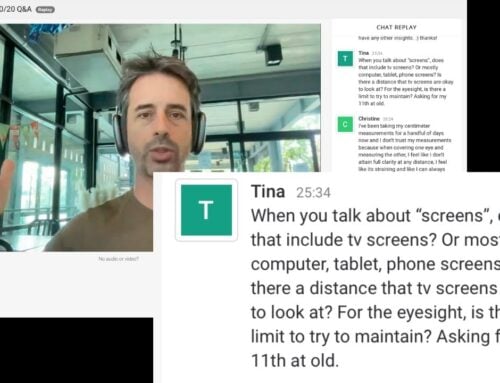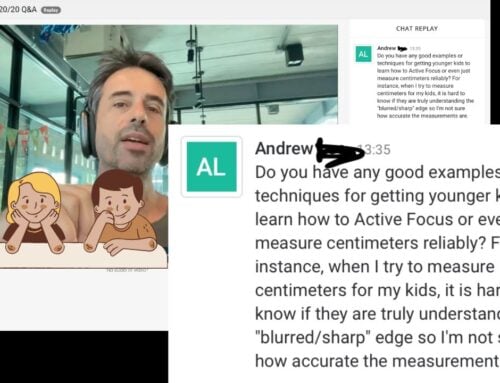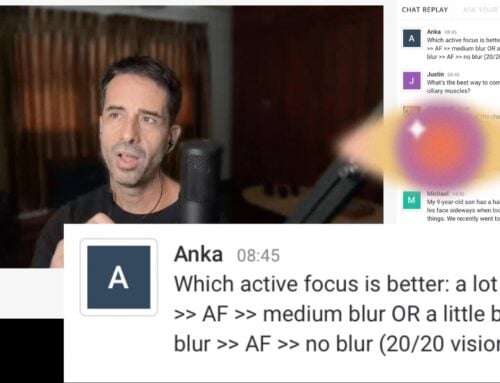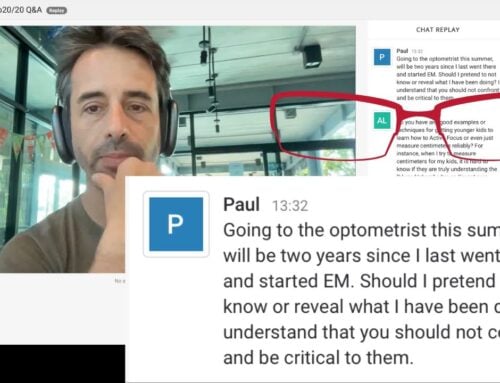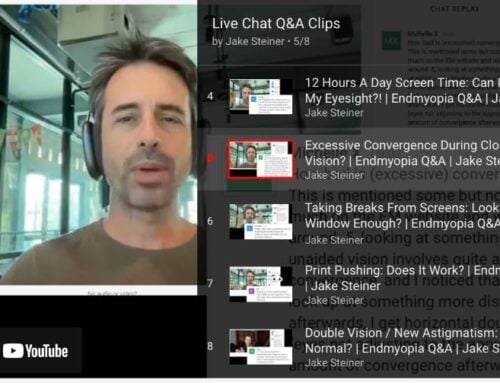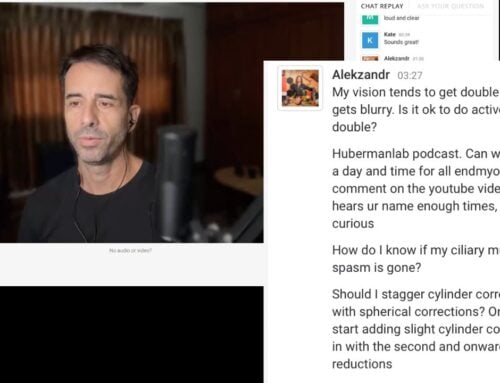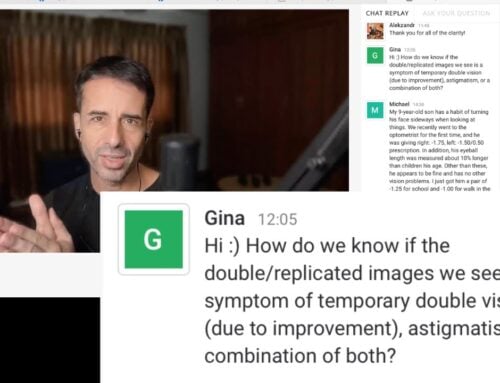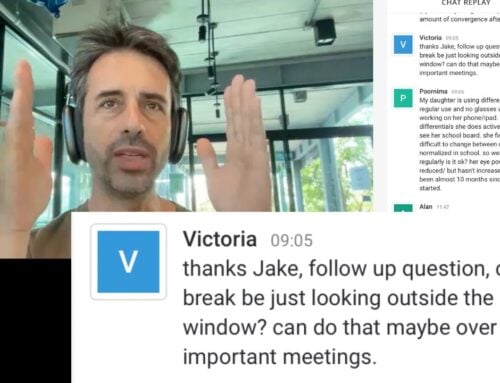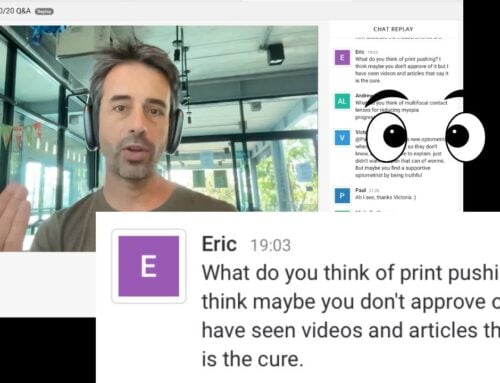If you’re here reading, you probably wear glasses, and have myopia.
Who got you into this mess?
Hopefully if you are here reading, you’ve already experienced some success in reducing your myopia. You hopefully already have measurable 20/20 gains and are using the awesomeness of this bloglet to keep you motivated and keep learning more tricks.
The questions is still here, though. Who got you into higher and higher myopia?
You know exactly who we’re talking about. (*cough-optometrists*)
So do you go back to those guys, those lens sellers, potentially unsupportive, likely biased, to confirm with them that what they did to you was the wrong “treatment”? Does it make sense to do that?
Well. Kind of.
It’s the ultimate test, in so many ways. If the (not really but hey) enemy has to concede defeat, then there can be no shadow of a doubt that your gains are real. But that’s easier said than done. First, you do want to consider a few details before heading off to the optometrist.
How Not To Approach The Optometrist
I’ll quote a recent support forum post here. Heads up, this might not be an inspirational read.
We have to confront various realities though, to learn:
Hello,
I just got back from my first eye exam since I started the program eight months ago and I have a few questions and feel the need to vent. Sorry in advance for the long forum post but there is a lot on my mind.
I wasn’t sure when I should bring up the topic of “naturally reducing my myopia” to my optometrist because I was afraid of the response I would get from him. So I went in and decided I was not going to talk to him about it until my eye exam was completed. I woke up this morning and did not look at my phone once, and spent 30 minutes outside, just to prep my eyes for good results for this exam. After an hour in the waiting room, it was my turn. They did all those tests with the puffing of air into my eyes, and the bright flashy lights, which I feel isn’t the best prep for reading an eye chart. My doctor, of course, assumed that the current glasses Rx I was wearing was my “actual” prescription he gave me a year ago. (Glasses: -10.25 left and -10.00 right) He didn’t know that I was currently wearing glasses from Zenni that is a prescription of -8.25 for both eyes. Well, after my eye exam he told me my eyes haven’t changed, which means I left there with a prescription of -10.25 left and -10.00 right, and I am pretty sure he added some astigmatism to my left eye. I had very high anxiety and right when I heard this I just wanted to run out of the room and cry (sounds dramatic, I know, but it is true). I decided to not even bring up my situation and just leave the doctors office.
On another ote, I do believe my eyes have changed. I read the Snellen chart outside once a month in natural lighting, and I see progress. I am now on my second normalized and read the 20/20 line on the Snellen outside with my normalized Rx of -8.25 (-7.50 with contacts) I actually just did this two days ago. The Lux outside was very high, but still, I read the 20/20 line. I then did my Snellen chart inside, in natural lighting but a much lower Lux, and could almost read the 20/20 line. I decided this means I should wait a few more weeks to go down to my third normalized Rx. But now I am so confused. Based off of my optometrist’s results, what do I do? I want to trust my eyes through this process. Could he have made a mistake? While I was waiting for the doctor to come in, I was wearing my current normalized Rx glasses and could read the 20/20 line on his screen. But when he put the big machine-like glasses thing over my eyes, I could see the 20/20 line extremely sharp, and I am assuming that was with the -10.00 prescription.
I know during this process, we are not going to see crystal clear and extremely sharp. I am just confused by his results and hope I am actually making progress and it is not all in my mind. I have been very dedicated to this program, and I am so thankful for it, and I work very hard with my habits.
Almost done venting…
When it comes to alternative/natural medicine and self-healing, I truly believe it is possible. There have been so many times I have tried to talk to my doctors about this subject, and they talk to me like I am a complete idiot for believing any of it. Whether it be replacing medicine with herbs, avoiding vaccines, food as medicine, or not wanting to take certain medications, they always give me rude responses. I have done this with my family doctor, clinical advisors, OB doctors, professors, and psychiatrist; and each one has responded to me like I am completely stupid for believing in it. This is why I was so afraid to bring this subject up to my optometrist because It can be exhausting being constantly rejected and looked down on.
I guess I am just lost right now and any words would help. Thanks!
That’s rough.
And even though reading this might sow all sorts of doubt about endmyopia in your mind, I post it here anyway. We can’t just sugarcoat everything, be all fluffy clouds and rainbows. Hard realities have to be confronted.
Since the question came in the BackTo20/20 support forum, it got a detailed reply from me. One that we’ll look at here, since you too might find yourself in a similar situation.
The Right Way To Get (Somewhat) Unbiased Answers
You have to take the time to understand what you’re walking into. Here’s my comment:
I’ve been there! Lots of us have definitely been there.
There used to be a time when I said, don’t go back to the optometrist. Because of the various frustrating stories. I never went to an optometrist for an eye exam after a half dozen bad experience when I was in the early part of my own progress. Didn’t go back for years. Eventually yes, and realized a few things that really help:
1. Change optometrist.
2. Change optometrist. ?
3. ….
You want somebody who doesn’t have your previous “prescription”. They use the autorefractor to get a baseline. If they have your previous numbers already, many of them will use that. It’s semi unlikely for any of them to dial in lower numbers even starting your eye exam. And of course in a dark room, for 1 minute, that high correction will produce results, so that’s what you get.
The higher correction will just give you a giant headache and make you feel disoriented in more light, or after more than a few minutes. But briefly, it’ll work.
So there that’s where the numbers come from.
Go to a new optometrist, with your normalized, set the stage where your odds are not stacked as highly against you. Super key, this.
Second.
I stopped telling people not to go to the optometrist. It’s a tricky thing either way, and I don’t want to add to it the idea that improvements are imaginary and can’t be verified at the optic shop. Because definitely they can and will, though usually a bit slower than your own results. They’ll always be 10% to 25% behind your own measurements, but they’ll be showing the same trend.
As long as they don’t start out with your old correction, at least.
Of course this is not true in all cases. Some optometrists are awesome and supportive and will work with you, not against you.
It’s a challenging thing altogether, learning to trust yourself. We’ve been indoctrinated to trust the establishment since we were little kids. Doctor knows. Doctor can save you. It’s like magic almost, these guys are the guardians of your health. And we believe that, and we have to recognize that this inclination is strong.
Part of the deal, this. Learning to trust yourself, your own eyes. Can you read a line you couldn’t a month ago? Well. The voice in your head goes, it’s a trick. You just got better at xyz imaginging things. But then it’s another line. And then it’s seeing that sign across the street, being able to read it when you couldn’t last month. What is that? Can we extrapolate from this that we’re on the right track?
Learning to trust yourself, big part of the puzzle. And it’s a safeguard against snake oil things, so it’s fine to respect the reticence, to say ok, it’s good that I’m skeptical. All the most successful business guys I know are skeptics and paranoid. You have to question things. Science too, based on questioning everything.
So question. Include the optometrist, their education, their bias towards high correction in the skepticism. Keep tracking your results. Look at the big picture as you continue on, realizing that it takes time to reach accurate conclusions.
Make sense?
Anytime you take personal responsibility for yourself, you’re playing in big boy territory. There’s limited handholding here, and you agreed to become your own expert. Yes you can get guidance from others, but answering the ultimate question of “does this really work”, is now up to you.

Tools. Can be used to sell you things. Or for you to find answers.
You either place that faith in others (and have to learn little or nothing), or you pull back the curtain and concede that now you have to learn to trust yourself.
It’s a slippery slope, and not for everyone.
Some can easily get lost in the foggy world of conspiracy and self help circles. I’ve seen impressionable people go off the deep end, identifying with every nebulous condition that the Internet puts out there, and every magic chia seed cure. The mind is a powerful thing, and your body will follow where your ideas take it. So if you’re the type likely to get lost in the woods, then be careful with these things. Lots of stuff sounds great (appealing to hope and fear and greed and emotions in general). Doesn’t mean it’s real.
All that gloom talk, Jake.
Of course there are lots and lots of optometrist confirmed accounts of all the 20/20 gains. Here and here and here and here and here and here and here and here and … well. We could probably go on for a while, looking through hundreds of student progress reports.
Just be careful out there. Be skeptical, do your research, take the time to understand what’s going on. Naturally not everyone out there is a benign sage guru like your saint-like and ever patient and never opaquely sarcastic VanJakerhausen.
Update: Nate M.D., Adds To The Conversation
Worthwhile update to the original forum thread:
I saw the post by Jake in the blog, and just had to comment.
I think Jake is on the right track.
I am also a medical doctor. One of the things that brought me into the program was the realization that so much of modern medicine, “science”, is actually just marketing by the pharmaceutical companies. Another point is that with pharmaceuticals, while the medicine treats the disease, frequently the body adapts to the medication, becoming dependent. Then the disease is actually worse than before treatment. This has been documented with many medications, but usually the treating physicians are completely unaware that the treatment might be worsening the course of the disease.
So Jake’s claim that a similar process occurs with lenses and optometry is not so strange-it is to be expected.
When I started the process, I decided to give it 2 full years and then go to the optometrist. As Jake recommends, I went to one who had never seen me before-I wanted him to be “blinded” to the process. I was down 2 full diopters.
I would recommend giving it some more time, then go to an optometrist who doesn’t know you. Also, keep meticulous records of your own snellen and centimeter progress.
Hope that helps. We’re all rooting for you.\
Nate
That’s it. The rest as they say, is up to you!
;)
Cheers,
-Jake

